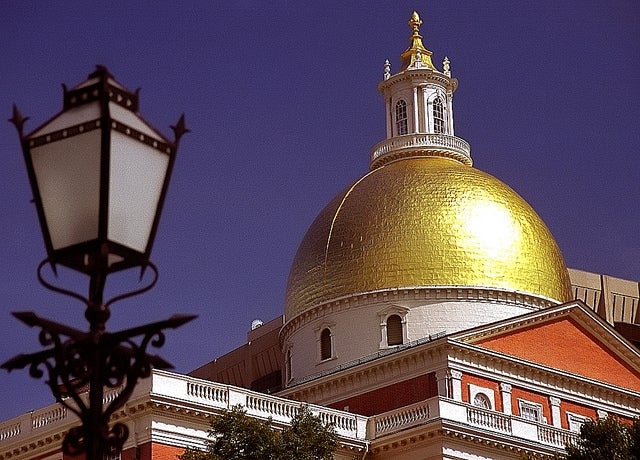State tax revenues will grow by 3.9 percent next fiscal year, state budget managers predicted Thursday, giving Gov. Charlie Baker and the Legislature about $27 billion to help build the state’s fiscal year 2018 budget.
Gov. Charlie Baker’s budget chief and the chairs of the House and Senate Ways and Means Committees announced on Thursday an agreement over how much tax revenue that state expects to collect in the next fiscal year that begins on July 1. The estimate of $27.072 billion in tax revenues for fiscal 2018 amounts to $1.02 billion more than the estimate used to finance the current year’s spending plan.
The estimate will serve as the basis for Baker’s budget, which is due on Jan. 25, and budget-building exercises this spring and summer in the House and Senate.
Despite the lowest unemployment rate in 15 years and heightened consumer and business confidence, state budget managers have had to scramble this fiscal year and last to adjust as state tax collections have not lived up to their initial projections amid a slow-growing economy.
In announcing the agreed-upon revenue figure, budget officials used words like “conservative,” “cautious,” “stable” and “modest” to describe the forecast of the state revenue picture that, if met, would easily out pace the current rate of growth half way through fiscal 2017.
“This conservative estimate reflects our cautious optimism about the Commonwealth’s economic position,” Senate Ways and Means Chairwoman Sen. Karen Spilka said in a statement. “Throughout the fiscal year 2018 budget process, we will continue to carefully monitor revenue performance to build a fiscally responsible, balanced budget that invests in the health and prosperity of people and communities across the state.”
Administration and Finance Secretary Kristen Lepore said the “modest growth” provided in the forecast is “in line with testimony we heard in December” at the annual consensus revenue hearing.
At that hearing, the Department of Revenue, budget-tracking think tanks and Massachusetts economists provided estimates of revenue growth that came in as low as 2.65 percent and as high as 5.2 percent. The consensus revenue figure announced Thursday is closest to the 3.7 percent growth estimate offered by Northeastern University economist Alan Clayton-Matthews.
“This Consensus Revenue agreement reflects continued stable growth and is in line with current economic trends,” Rep. Brian Dempsey, House chairman of the Ways and Means Committee, said in a statement.
The 3.9 percent growth figure, the budget managers said, assumes the state income tax rate will drop from 5.1 percent to 5.05 percent on Jan. 1, 2018, which DOR has previously said would result in an $83 million reduction in state revenue. Recent economic growth was not significant enough to statutorily trigger an income tax cut on Jan. 1, 2017.
The Massachusetts Taxpayers Foundation on Thursday projected Massachusetts will face a structural deficit of more than $800 million in fiscal 2018. The business-backed budget watchdog group’s projection was the most conservative of those who offered testimony at December’s hearing – 2.65 percent revenue growth.
“The decisions made to close that deficit in the coming months will influence whether or not the state can avoid a 4th consecutive year of midyear budget problems,” MTF said in a bulletin published late Thursday afternoon. “The assumption of 3.9 percent tax revenue growth — compared to 4.31 percent at this time last year — indicates a more conservative approach to budgeting, but given that tax revenue has grown by just 2.28 percent in FY 2016 and 2.34 percent to date in FY 2017, it remains to be seen if these budget assumptions are conservative enough.”
With half of fiscal 2017 in the books, state tax collections have grown just 2.3 percent to date, DOR announced last week.
Lepore, Dempsey and Spilka also agreed Thursday on a transfer of just more than $1 billion to the Massachusetts Bay Transportation Authority, an $841 million transfer to the Massachusetts School Building Authority, and $22.9 million to the Workforce Training Fund.
There will also be a $2.395 billion transfer to the state pension fund — an increase of $196 million over the fiscal 2017 contribution — which is expected to keep Massachusetts on track to fully fund its pension liability by 2036.
“The decision to devote increased resources to maintain the current pension schedule demonstrates fiscal responsibility,” Dempsey said in the statement. “This agreement allows us to begin the FY18 budget process and balances the investments of today with a commitment to meeting our long term future spending obligations.”
After a total of $4.368 in transfers, the maximum amount of tax revenue available for the fiscal 2018 budget will be $22.704 billion, the officials agreed. The state budget, which totals $39.2 billion this fiscal year, it supplemented by federal revenues along with non-tax revenues like fees.
The agreement also assumes $1.271 billion in capital gain taxes, but the announcement did not specify whether capital gains in excess of roughly $1 billion would be deposited in the state’s stabilization fund, or again be diverted for other budget purposes.
With less than two weeks until Baker is scheduled to unveil his third budget as governor and set in motion a budget process that will last into the summer, Lepore said she is prepared to work with Spilka and Dempsey to “develop budgets that keep spending in line with revenue, while also funding important budget priorities and maintaining the Commonwealth’s course for addressing long-term fiscal obligations.”
Lepore, Dempsey and Spilka also agreed to a 3.6 percent rate of potential gross state product growth for calendar year 2018, the same figure that has been used the past two years to set up a health care cost growth benchmark under the 2012 cost containment law.

